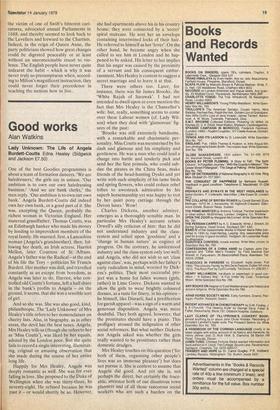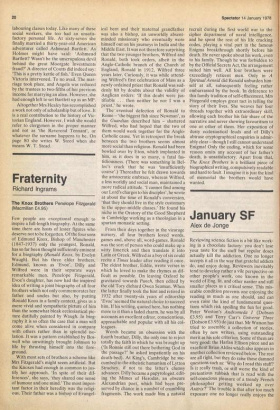Good works
Alan Watkins
Lady Unknown: The Life of Angela Burdett-Coutts Edna Healey (Sidgwick and Jackson £7.50)
One of the best Goodies programmes is about a team of formation dancers. 'We are hairdressers,' the girls say in unison, 'Our ambition is to own our own hairdressing business.' And we are bank clerks,' the men reply. 'Our ambition is to own our own bank.' Angela Burdett-Coutts did indeed own her own bank, or a good part of it. She was, excepting the Queen, probably the richest woman in Victorian England. Her maternal grandfather, Thomas Coutts, was an Edinburgh banker who made his money by lending to improvident members of the royal family. He married, first, a Lancashire woman (Angela's grandmother), then, following her death, an Irish actress, Harriot Mellon, later Countess of St Albans. Angela's father was the Radical — at the end of his life the Tory — politician Sir Francis Burdett. Her mother was dull, and travelled constantly as an escape from boredom, as Angela was later to do. Harriot, who controlled old Coutts's fortune, left a half share in the bank's profits to Angela — on the ground, it seems, that she was a sensible sort of girl.
And so she was. She was also good, kind, philanthropic. The 'Lady Unknown' of Mrs Healey's title refers to her nomenclature on charity lists. Alas, in biography, as in other areas, the devil has the best tunes. Angela, Mrs Healey tells us (though she refers to her as 'Miss Coutts'), was liked by her equals, adored by the London poor. But she quite fails to record a single interesting, illuminating, original or amusing observation that she made during the course of her entire long life.
Happily for Mrs Healey, Angela was deeply romantic as well. She was for ever falling in love. She proposed to the Duke of Wellington when she was thirty-three, he seventy-eight. He refused because he was past it — or would shortly be so. However, she had apartments above his in his country house; they were connected by a 'secret' spiral staircase. He sent her an envelope containing intertwined locks of their hair. He referred to himself as her 'lover'. On the other hand, he became angry when she called to see him in London and he happened to be naked. His letter to her implies that his anger was caused by the proximity of a servant and his consequent embarrassment. Mrs Healey is content to suggest a secret marriage and to leave it at that.
There were others too. Later, for instance, there was Sir James Brooke, the 'White Rajah of Sarawak'. I had not intended to dwell upon or even mention the fact that Mrs Healey is the Chancellor's wife: but, really, something seems to come over these Labour women (cf. Lady Wilson) when they deal with 'glamorous' figures of the past: 'Brooke was still extremely handsome, with a remarkable and charismatic personality. Miss Coutts was mesmerised by his dash and glamour and his simplicity and gentleness. He was a man who could lead a charge into battle and tenderly pick and send her the first primula, who could subdue the pirates in the China Seas, make friends of the head-hunting Dyaks and yet write with such simplicity of his tame birds and spring flowers, who could reduce rebel tribes to awestruck admiration by his superb horsemanship yet was happy to trot by her quiet pony carriage through the Devon lanes.' Wowl Charles Dickens, another admirer, emerges as a thoroughly sensible man. In particular Mrs Healey's account rebuts Orwell's silly criticism of him: that he did not understand industry and the classsystem and relied upon 'goodness' and a 'change in human nature' as engines of progress. On the contrary, he understood industry and the class-system only too well; and Angela, who did not wish to set 'class against class', was, perhaps with her father's early radicalism in mind, worried by Dickens's politics. Their most successful project was a home for fallen women (girls, rather) in Lime Grove. Dickens wanted to allow the girls to wear brightly coloured dresses, as a taste for finery, in his opinion — he himself, like Disraeli, had a predilection for garish apparel —was a sign of a warm and generous disposition. Angela was more doubtful. They both agreed, however, that the prostitutes should have a piano. This profligacy aroused the indignation of other social reformers. But what neither Dickens nor Angela asked was whether the girls really wanted to be prostitutes rather than domestic drudges.
Mrs Healey touches on this question ('for both of them, organising other people's lives was an immense pleasure') but does not pursue it. She is content to assume that Angela did good. And yet she is, not perhaps the direct, but certainly the traceable, ancestor both of our disastrous town planners and of all those rancorous social workers who are such a burden on the labouring classes today. Like many of these social workers, she too had an unsatisfactory personal life. At sixty-seven she finally married a thirty-year-old American adventurer called Ashmead Bartlett. As Holmes might have said: 'Ashmead Bartlett? Wasn't he the unscrupulous devil behind the great Moorgate Investments fraud?' A director of Coutts did indeed say: 'This is a pretty kettle of fish.' Even Queen Victoria intervened. To no avail. The marriage took place, and Angela was reduced by the trustees to two-fifths of her previous income for marrying an alien. However, she had enough left to set Bartlett up as an MP.
Altogether Mrs Healey has accomplished a work not only of scholarship but of love. It is a real contribution to the history of Victorian England. However, I wish she would refer to clergymen in the proper manner and not as 'the Reverend Tennant', or whatever the surname happens to be. On page 80 she writes W. Steed when she means W. T. Stead.































 Previous page
Previous page